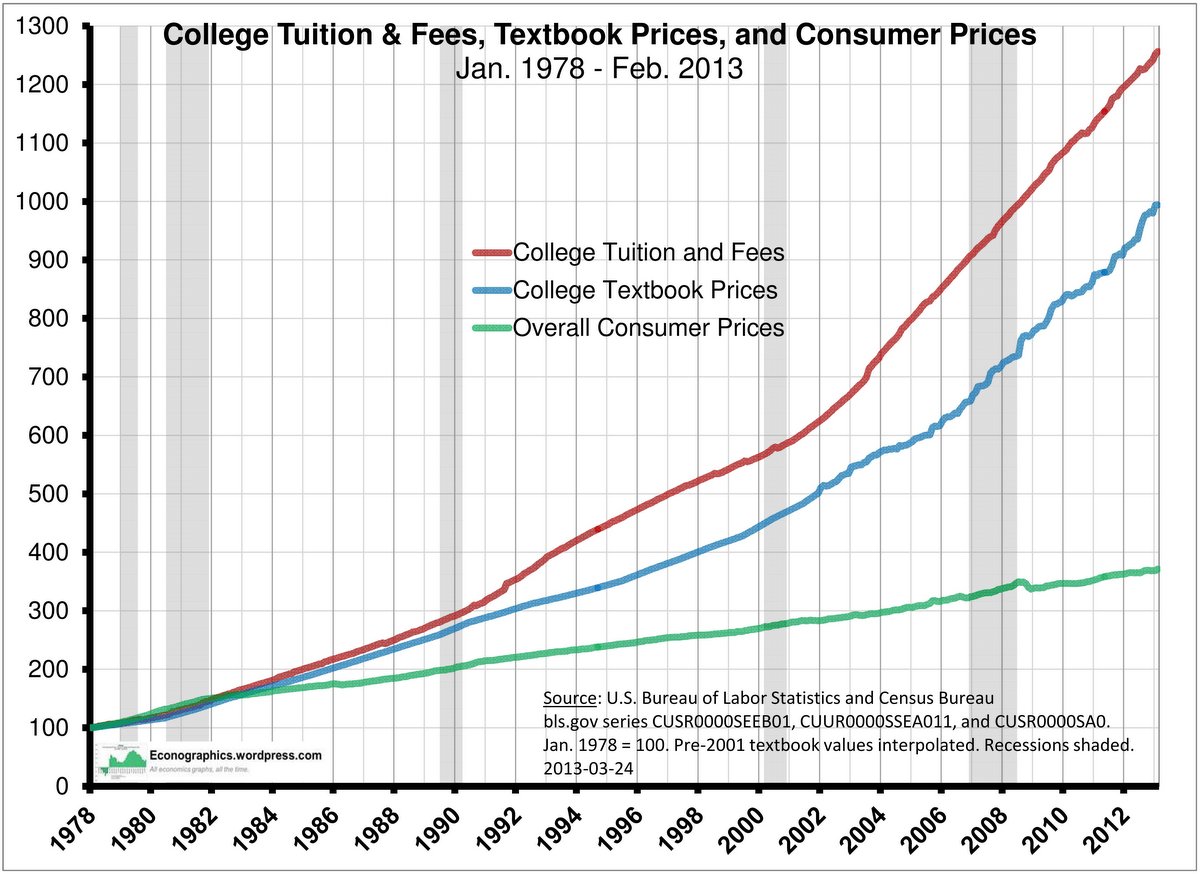Textbooks are essential instructional tools but they’re not without problems. Most familiar to students is the problem of cost: textbook prices have been significantly outstripping inflation for some time, rising 82% between 2003 and 2013 and giving rise to charts like the one below. But there’s also the issue of tailoring. There might not be a textbook that’s a perfect match for a given instructor’s needs, but the traditional model requires students to purchase material their instructors may have no interest in teaching.
Authors from a variety of fields are making strides to bring accessible and open educational resources that provide educators with choice regarding the price and contents of course materials. Legal education, which relies in large part on public domain texts like cases and statutes, is particularly poised for change. Authors Alliance members, committed to authorship in the public interest, are leading the charge.
The most recent development comes from the Duke Center for the Study of the Public Domain, where Authors Alliance founding members James Boyle and Jennifer Jenkins have published an open casebook and statutory supplement, Intellectual Property: Law & the Information Society. The first in a series the Center plans on publishing, the book is now available as a free download or for an affordable price in print.
As intellectual property scholars with a more-than-passing familiarity with open licensing, Boyle and Jenkins are eager to explain how they came to publish an open coursebook. Their FAQ provides a walkthrough of why they believe the project is important. They identify concerns about the cost of educational resources, but also point out that allowing others to modify and distribute their work will help tailor the book to reach other audiences that might be interested to learn about the law of intellectual property but might not read a casebook cover-to-cover, much less pay for a traditional offering.
Publishing under a Creative Commons license, Boyle and Jenkins fully expect that others will modify the book in order to make it work for their needs. They write that “[t]he book is intended to be a textbook for the basic Intellectual Property class, but because it is an open coursebook, which can be freely edited and customized, it is also suitable for an undergraduate class, or for a business, library studies, communications or other graduate school class.”
While traditional publishers have been experimenting with digital distribution, prices remain high and efforts have been made to use digital copies to restrict the resale of paper casebooks. It is increasingly clear that the promise of digital publishing is more likely to be realized by the efforts of committed authors rather than by traditional publishers.
The launch of the Duke open casebook series is only the latest effort in a growing trend in legal education whereby textbook authors are taking advantage of digital distribution to increase the accessibility and change the nature of course materials. Other authors, like Authors Alliance founding member Barton Beebe, have released their casebooks on the web under Creative Commons licenses. And the Harvard Law School Library and the Berkman Center for Internet and Society have actually built a textbook creation service, H20, that allows users to develop, remix, and share custom course materials based on CC-licensed source material. Jonathan Zittrain, a member of the Authors Alliance Advisory Board, is leading the project and has posted his Torts casebook into the system. You can hear watch Zittrain explain his vision for H2O here.
Access doesn’t need to come at the expense of compensation for authors. For instance, Semaphore Press, a for-profit publisher of law school casebooks that considers accessibility to be an essential part of it mission, provides a balanced approach to educational publishing. Semaphore, founded by Lydia Loren, a professor at Lewis & Clark Law School and an Authors Alliance founding member, charges $30 for a download of any of its DRM-free casebooks, but also provides a pay-what-you-want option to ensure that students have access to their assigned texts. The Semaphore collection includes Loren’s Intellectual Property casebook as well as Authors Alliance founding member James Grimmelmann’s Internet Law casebook.
Boyle and Jenkins write that “Legal education is already expensive; we want to play a small part in diminishing the costs of the materials involved.” The myriad efforts by Authors Alliance members might very well combine to play much more than a small part in increasing access to legal educational materials.
Discover more from Authors Alliance
Subscribe to get the latest posts sent to your email.

